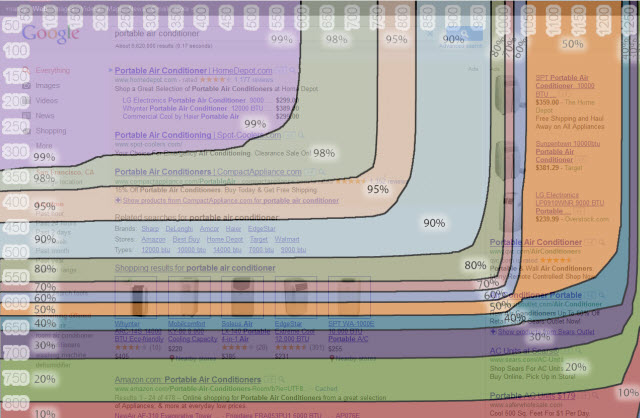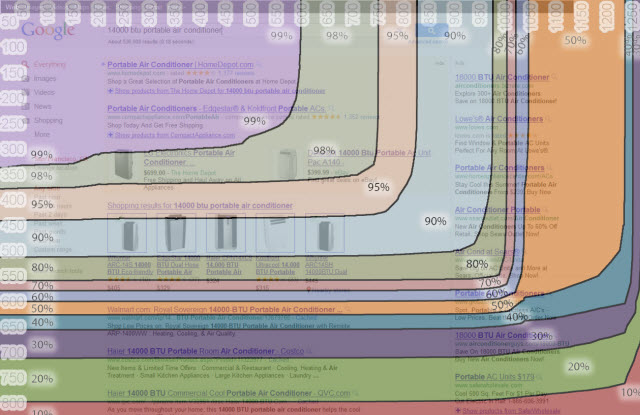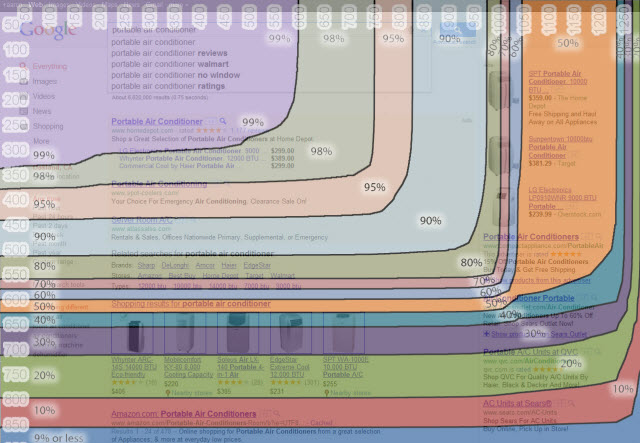eCommerce SEO? Google AdWords or No Soup for You
Affiliates Are a Dying Breed
Being an ecommerce affiliate keeps getting harder & harder unless you have a strong brand and/or are selling things with a complex sales cycle.
Portable air conditioners is a pretty niche category, but when I look at it I simply don't see any opportunity on the SEO front unless you take on the significant risk of carrying inventory & drop hundreds of thousands to millions of Dollars on branding.
The Corporate, The Bad & The Ugly
Head keyword: note the brand navigation, the extended AdWords ads & the product search results that drive the traditional search results below the fold

Tail keywords are every bit as ugly, with Google product ads sometimes coming in inline, further driving down the organic search results.

And it is nastier when Google Instant is still extended. 10% of browsers can see a single organic search result!

Corporate, Corporate, Corporate
As ugly as that looks, not only do the larger merchants have an advantage in AdWords (getting their product ads on a CPA basis while smaller merchants have to pay on a CPC basis), Google product search (more reviews), inline search navigation options (featuring the same brands yet again), but most of the organic results (that are generally below the fold) are also the same big brands after the Panda update gave them a boost while torching their smaller competitors.
The Chicken vs Egg Problem of Scale
For online pure-plays (outside of Amazon.com, eBay & a few others) the "no opportunity anywhere" problem in search also harms the ability to be competitive on pricing because without the ability to rank you don't have the leverage over the supply chain the way that the big box stores do from winning everywhere in the SERP & having offline distribution. There is little opportunity to organically grow to scale over time unless you enter the market with some point of leverage (like going so far as creating the product right on through to marketing it to consumers), sell something totally different than what is already available in the market (and hope it doesn't get cloned), buy out an existing company that went bankrupt, and/or build significant non-search distribution channels first.
I suppose the last option on that front would be to promote your stuff on a large platform that is already doing well in Google (say eBay, Amazon, or Facebook), but doing that gives you limited control over the customer experience & forces you to keep chasing new one-off sales rather than building & deepening relationships with customers.
Killing Off Diversity
As Google collects more usage date (mobile is already 12% of search) these big box stores will have an even bigger moat between them & smaller competitors.
The "big box stores only" search results also create an experience that is bland & uniform. At first glance things may look different, but it is the same type of sites again and again: a lot of the brands cross hire, have similar "politically correct" cultures & have roughly similar customer experience sets. When you buy from Walmart you are not going to get that caring email from a founder offering hands on tips & advice. Scale requires homoginization, which generally kills of personality & differentiation.
Killing Off Innovation
The problem with the "be huge or die" approach to search is that most legitimate economic innovation comes from smaller players that challenge the existing power structure. Set the barrier to entry too high and you might have less spam to fight, but you certainly will have less economic innovation & more of the would-be innovators will be stuck working dead end job at dysfunctional corporations.
Now You See it, Now You Don't
Most people can't see what they are missing out on so they won't know, but (as Tim Wu put it so eloquently in The Master Switch) the same was true for AT&T when it held back innovations like the answering machine & what ultimately came to be the WWW. What sort of price do you put on email taking a decade longer to launch? How many other disruptive changes built off of incremental improvements will never appear because they simply weren't large & corporate enough to compete on Google's web?
The web was great because it offered something different. Unfortunately you have to search using something other than Google to find it.




Comments
Excellent article. Some really great points about big business and the advantages in search over small business that they have! It reminds me of that cliche " The rich get richer and the poor get poorer"
Excellent article (as usual)
"the web was better" when there was no hand in glove influence on search results between grand brands and Google just for profitable purposes.
The big advantage of the web is that WWW is an open source communication plateform.
Everyone has access to it.
Google is hurting itself and sawing the branch that they're sitting on by just favoring companies that pay them money.
just remember that google outran the yellow Pages with a search engone that permitted you to find just about anything and nobody had to pay to be there.
By implementing so many rules to favor their big clients, Google is no longer a search engine anymors but just an SAE (search advertising engine.).
By continuing in the direction that they've taken, Google is slowly but surely leaving a big open space for a new website with a pure search engine service and the bet is that there are new search engines in the making that will outrun Google.
The funny thing is that Google is making it easier and easier for a competitor to become a major global search engine by polluting their own search engine with to much relevant advertising content.
How does a website work ?
Give out free content (SEO information for example) or a free service (how about a search engine for example) to drive trafic to your website (Google is just a website, nothing more, nothing less) and propose products and services for sale to earn money.
By screwing up their search engine with to much advertising results they'll wind up having the same problem as the Yellow Pages. One can no longer find just about anything because only pay search will appear in Google's SERPS.
Companies, like products, have a life cycle.
Unless you stick to what you're good at you'll shorten the lifecycle of a product or a company.
Just imagine Mercedes benz coming out with cheap cars to compete against Kia or Hyundai, or a fancy sportscar to compete with Porsch or Ferrari. Not only would they have little chance to succeed but they would leave a big open space for Lexus (for example) to occupy the market that they own.
So be it. let google become an SAE (search advertising engine) and people who are allready fed up with outbound marketing will search for new ways of searching what they want to find.
Yeah, Google is crushing the little businesses so they have to pay for AdWords, at least it appears that way.
As you know Panda was hit internationally a few days ago. My biggest site was hit big time by the English update and then again in Spanish just a few days ago, overall it dropped 50%. I have several different types of sites and could make some insightful observations.
I’ll try to be brief:
Based on analytics of several sites including friends sites, some hit, some not, we found these very clear conclusions: Time on site, Bounce rate and page views per visitor are now very important factors. A site with just photos and model profiles (virtually no “content”) was not affected. This site had a high number of page views per visitor, low bounce rate and long time on site. On the other hand, a site with all original content and lots of content was hit bad. This site had a very high bounce rate, low time on site and low page views per visitor. All sites that we saw hit were poor in these on site factors.
This leads to my first point: The site with low content and high on site results (many pageviews per visitor, long time on site) might as well be any site with pictures of beautiful women on it. It could just as well be a porn site, or the worse mess you can imagine, in this case time on site and these other factors in no way reflects quality.
My second point: Is usability no longer relevant? We run some sites that are not blogs/content sites. Yes, these sites still exist and are needed. People need to find answers, services, businesses, products, etc. and the faster they can find it on your site better. Yet Google is saying they must stay on your site and view many pages to deem your site good quality. I’m sorry but the job of some of our sites is to get people from our site to what they are looking for and click through as soon as possible. So now we’re supposed to try to keep them on our site? Not all sites are blogs!
Finally, as I noticed by the Panda update and what Google’s is saying with their rhetoric about quality sites, their search results are being oriented to favor content sites and penalize other types of sites including stores, business and other commercial sites. The result? Now these sites need to pay Google some AdWords cash to get the traffic they used to get organically. This will also favor their AdSense program since almost all content based sites use AdSense while commercial sites and stores sell their own products. Smart move Google, but you don’t have me fooled. :)
First, it was IBM. Then, it was Microsoft. Now, it is Google.
Big, dull corporates, hanging with other big, dull corporates, congratulating themselves on how clever they are. If they weren't so smug, they might realize the interesting stuff happens elsewhere.
When I step away from Google and follow people around the web, I end up in more interesting places.
Great point Peter - I have seen this in lots of verticals, once the leaders start getting fat and happy. The circle jerking happening in board rooms is just silly...and IMO, it eventually causes the downfall of otherwise strong businesses. The ivory tower is only cool when you have a golden parachute there to escape at will.
Right, Martypants.
And I agree 100% with Aaron's point that if Google don't leave anything on the table for the little guy, then their serps are going to grow forever duller.
@rolover: big up for a very good comment.
I would agree that Bounce Rate and time on site are too much of a factor now. I work on a highly competitive environment with a high portion of browsing traffic for some of the top keywords.
I have also seen some of our affiliates who used to simply copy and paste our product description onto their sites, falling off the cliff when Panda 2.3 hit.
I have checked with some other large affiliates who took the time either to rewrite or complete our prod. description, faring better than before
I feel that ecommerce SEO is becoming increasingly difficult at scale unless you effectively engage in a high quality product content management. Prime example is Zappos. Absolutely appaling for their SEO architecture yet on path to become very poweful on the SEO scene with a few tweaks
Add new comment